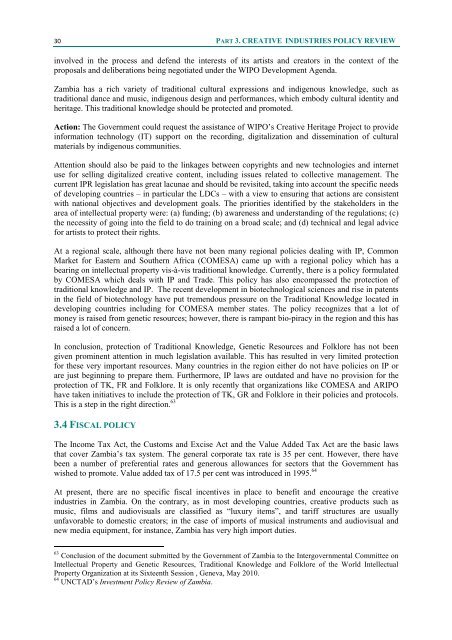Strengthening the Creative Industries in Zambia - Unctad
Strengthening the Creative Industries in Zambia - Unctad
Strengthening the Creative Industries in Zambia - Unctad
Create successful ePaper yourself
Turn your PDF publications into a flip-book with our unique Google optimized e-Paper software.
30 PART 3. CREATIVE INDUSTRIES POLICY REVIEW<br />
<strong>in</strong>volved <strong>in</strong> <strong>the</strong> process and defend <strong>the</strong> <strong>in</strong>terests of its artists and creators <strong>in</strong> <strong>the</strong> context of <strong>the</strong><br />
proposals and deliberations be<strong>in</strong>g negotiated under <strong>the</strong> WIPO Development Agenda.<br />
<strong>Zambia</strong> has a rich variety of traditional cultural expressions and <strong>in</strong>digenous knowledge, such as<br />
traditional dance and music, <strong>in</strong>digenous design and performances, which embody cultural identity and<br />
heritage. This traditional knowledge should be protected and promoted.<br />
Action: The Government could request <strong>the</strong> assistance of WIPO’s <strong>Creative</strong> Heritage Project to provide<br />
<strong>in</strong>formation technology (IT) support on <strong>the</strong> record<strong>in</strong>g, digitalization and dissem<strong>in</strong>ation of cultural<br />
materials by <strong>in</strong>digenous communities.<br />
Attention should also be paid to <strong>the</strong> l<strong>in</strong>kages between copyrights and new technologies and <strong>in</strong>ternet<br />
use for sell<strong>in</strong>g digitalized creative content, <strong>in</strong>clud<strong>in</strong>g issues related to collective management. The<br />
current IPR legislation has great lacunae and should be revisited, tak<strong>in</strong>g <strong>in</strong>to account <strong>the</strong> specific needs<br />
of develop<strong>in</strong>g countries – <strong>in</strong> particular <strong>the</strong> LDCs – with a view to ensur<strong>in</strong>g that actions are consistent<br />
with national objectives and development goals. The priorities identified by <strong>the</strong> stakeholders <strong>in</strong> <strong>the</strong><br />
area of <strong>in</strong>tellectual property were: (a) fund<strong>in</strong>g; (b) awareness and understand<strong>in</strong>g of <strong>the</strong> regulations; (c)<br />
<strong>the</strong> necessity of go<strong>in</strong>g <strong>in</strong>to <strong>the</strong> field to do tra<strong>in</strong><strong>in</strong>g on a broad scale; and (d) technical and legal advice<br />
for artists to protect <strong>the</strong>ir rights.<br />
At a regional scale, although <strong>the</strong>re have not been many regional policies deal<strong>in</strong>g with IP, Common<br />
Market for Eastern and Sou<strong>the</strong>rn Africa (COMESA) came up with a regional policy which has a<br />
bear<strong>in</strong>g on <strong>in</strong>tellectual property vis-à-vis traditional knowledge. Currently, <strong>the</strong>re is a policy formulated<br />
by COMESA which deals with IP and Trade. This policy has also encompassed <strong>the</strong> protection of<br />
traditional knowledge and IP. The recent development <strong>in</strong> biotechnological sciences and rise <strong>in</strong> patents<br />
<strong>in</strong> <strong>the</strong> field of biotechnology have put tremendous pressure on <strong>the</strong> Traditional Knowledge located <strong>in</strong><br />
develop<strong>in</strong>g countries <strong>in</strong>clud<strong>in</strong>g for COMESA member states. The policy recognizes that a lot of<br />
money is raised from genetic resources; however, <strong>the</strong>re is rampant bio-piracy <strong>in</strong> <strong>the</strong> region and this has<br />
raised a lot of concern.<br />
In conclusion, protection of Traditional Knowledge, Genetic Resources and Folklore has not been<br />
given prom<strong>in</strong>ent attention <strong>in</strong> much legislation available. This has resulted <strong>in</strong> very limited protection<br />
for <strong>the</strong>se very important resources. Many countries <strong>in</strong> <strong>the</strong> region ei<strong>the</strong>r do not have policies on IP or<br />
are just beg<strong>in</strong>n<strong>in</strong>g to prepare <strong>the</strong>m. Fur<strong>the</strong>rmore, IP laws are outdated and have no provision for <strong>the</strong><br />
protection of TK, FR and Folklore. It is only recently that organizations like COMESA and ARIPO<br />
have taken <strong>in</strong>itiatives to <strong>in</strong>clude <strong>the</strong> protection of TK, GR and Folklore <strong>in</strong> <strong>the</strong>ir policies and protocols.<br />
This is a step <strong>in</strong> <strong>the</strong> right direction. 63<br />
3.4 FISCAL POLICY<br />
The Income Tax Act, <strong>the</strong> Customs and Excise Act and <strong>the</strong> Value Added Tax Act are <strong>the</strong> basic laws<br />
that cover <strong>Zambia</strong>’s tax system. The general corporate tax rate is 35 per cent. However, <strong>the</strong>re have<br />
been a number of preferential rates and generous allowances for sectors that <strong>the</strong> Government has<br />
wished to promote. Value added tax of 17.5 per cent was <strong>in</strong>troduced <strong>in</strong> 1995. 64<br />
At present, <strong>the</strong>re are no specific fiscal <strong>in</strong>centives <strong>in</strong> place to benefit and encourage <strong>the</strong> creative<br />
<strong>in</strong>dustries <strong>in</strong> <strong>Zambia</strong>. On <strong>the</strong> contrary, as <strong>in</strong> most develop<strong>in</strong>g countries, creative products such as<br />
music, films and audiovisuals are classified as “luxury items”, and tariff structures are usually<br />
unfavorable to domestic creators; <strong>in</strong> <strong>the</strong> case of imports of musical <strong>in</strong>struments and audiovisual and<br />
new media equipment, for <strong>in</strong>stance, <strong>Zambia</strong> has very high import duties.<br />
63 Conclusion of <strong>the</strong> document submitted by <strong>the</strong> Government of <strong>Zambia</strong> to <strong>the</strong> Intergovernmental Committee on<br />
Intellectual Property and Genetic Resources, Traditional Knowledge and Folklore of <strong>the</strong> World Intellectual<br />
Property Organization at its Sixteenth Session , Geneva, May 2010.<br />
64 UNCTAD’s Investment Policy Review of <strong>Zambia</strong>.

















